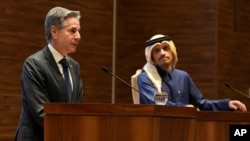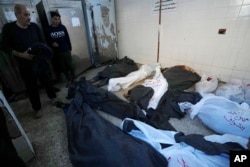U.S. Secretary of State Antony Blinken said Tuesday that Hamas militants’ leaders have responded to a proposed hostage deal that would pause the fighting in the Gaza Strip. He said the United States is studying their response intensely and will discuss it Wednesday in Israel.
During a press conference in Doha, Blinken told reporters that Hamas’ response to the proposal has been shared with Israel. In Washington, U.S. President Joe Biden described the response from the militant group as "a little over the top" and said the negotiation is continuing.
In Doha, Blinken said, “We will be working as hard as we possibly can to try to get an agreement so that we can move forward with not only a renewed but an expanded agreement on hostages and all the benefits that would bring with it.”
The top U.S. diplomat held talks Tuesday with Egyptian and Qatari leaders amid a push for a new temporary cease-fire in Gaza, and an increase in humanitarian aid for Palestinian civilians.
The United States, Egypt and Qatar helped craft the cease-fire proposal that is currently under consideration, which would include a pause in fighting lasting several weeks and the release of hostages held by Hamas in Gaza.
Blinken held talks with Qatar’s ruling emir, Sheikh Tamim bin Hamad Al Thani, and Qatari Prime Minister Mohammed bin Abdulrahman Al-Thani.
Al-Thani told reporters through a translator, “We have received a reply from Hamas with regards to the general framework of the agreement, with regards to hostages. The reply includes some comments, but in general, it is positive.”
The Qatari prime minister expressed optimism and said he hopes it will yield results on the hostage release in exchange for an extended cease-fire deal “very soon,” but declined to elaborate on the details due to its sensitivity.
Earlier on Tuesday, Blinken met with Egyptian President Abdel-Fattah el-Sissi in Cairo.
“Secretary Blinken and President el-Sissi discussed ongoing efforts to secure the release of all hostages held by Hamas,” State Department spokesperson Matthew Miller said in a statement. “Secretary Blinken emphasized the United States’ rejection of any forced displacement of Palestinians from Gaza and commitment to establishing a Palestinian state that provides peace and security for Israelis and Palestinians alike.”
At the United Nations, U.N. spokesperson Stephane Dujarric said that within the Gaza Strip, 20 partners have provided food assistance, reaching approximately 1.8 million people between January 29 and February 4.
Additionally, the World Food Program, or WFP, distributed over 190,000 food parcels in January, which is sufficient for approximately 955,000 people for 10 days. These parcels were provided to displaced individuals living in informal camps and with host communities in Gaza, Dujarric said.
Also on Tuesday, Martin Griffiths, the U.N.'s Emergency Relief Coordinator, said in a statement that hostilities in Gaza are on the verge of entering their fifth month. Griffiths noted that during this time, the population of Rafah has surged fivefold, with families crammed into shelters and forced to sleep outdoors.
According to the Office for the Coordination of Humanitarian Affairs, or OCHA, Rafah is already accommodating half of Gaza's population of about 2 million.
A previous temporary cease-fire in late November lasted for a week and brought the release of more than 100 hostages from Gaza and 240 Palestinian prisoners held by Israel.
Blinken began his trip Monday in Saudi Arabia. He also has stops scheduled in Israel and the Israeli-occupied West Bank.
Blinken held talks with Saudi Crown Prince and Prime Minister Mohammed bin Salman in Riyadh, where the State Department said the officials discussed regional coordination to bring “an enduring end to the crisis in Gaza that provides lasting peace and security for Israelis and Palestinians alike.”
A U.S. official said sensitive negotiations are expected during Blinken's meetings in the Middle East, where securing a humanitarian pause in Gaza is crucial for swiftly addressing key issues such as its reconstruction, Palestinian Authority reform, governance in Gaza, pursuing a two-state solution and facilitating normalization between Israel and Saudi Arabia.
Israeli Prime Minister Benjamin Netanyahu has recently increased pressure on Qatar, questioning its mediation role and urging Qatar to use its influence over Hamas for the hostages' release.
Richard Goldberg, a senior adviser at the Washington-based Foundation for Defense of Democracies, noted a shift in Israeli strategy due to Qatar's negotiation stance, which he says aligns with Hamas' demands, which Israel rejects.
“The Qatari position in negotiating now is the Hamas position, permanent cease-fire, removal of all Israeli forces in exchange for hostages being released. That is an unacceptable end state to the Israelis,” Goldberg told reporters in a recent press call.
Israel vowed to destroy Hamas, which governs Gaza, after the militant group sent fighters rampaging into Israel on October 7, 2023, killing around 1,200 people, mostly civilians, according to Israeli tallies. Hamas, which has been designated a terrorist organization by the U.S., Britain, the European Union and others, also took about 240 people hostage.
Israel's air and ground military operations in Gaza have killed more than 27,500 Palestinians and injured 66,900 others, according to the Hamas-run Health Ministry. The ministry includes both civilians and militants in its count but says 70% of those killed were women and children.
Israel’s military said Tuesday its forces had killed dozens of fighters in the southern Gaza city of Khan Younis during the past day. Israeli forces used airstrikes and tank fire, in addition to operations with ground forces in Khan Younis, which has been the recent focus of the Israeli war effort.
The fighting has pushed people who had already fled northern and central Gaza further south to the Rafah area.
The U.N. Office for the Coordination of Humanitarian Affairs said Israel’s military had placed two-thirds of the Gaza Strip’s territory under evacuation orders since the start of the Israeli operation in October. Before the war, those areas were home to 1.78 million people, the agency said.
The U.N. estimates Rafah is now hosting more than half of Gaza’s population, five times more people than before the war began.
VOA U.N. correspondent Margaret Besheer and White House Bureau Chief Patsy Widakuswara contributed to this report. Some information for this story came from Agence France-Presse and Reuters.








